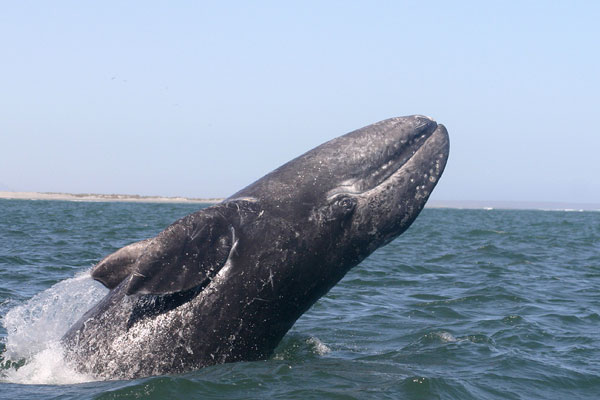
By: Pepper Fisher
NEAH BAY – A gray whale that was discovered entangled in a fishing net by Makah Tribe fishermen Thursday was towed into Neah Bay to be processed and distributed to about 350 households.
It’s a relatively rare but meaningful event for a community that has been waiting years for a permit to resume the centuries-long tradition of whaling that literally defined the Makah tribe’s identity among native people’s and early settlers. As Makah Chairman TJ Greene explains, bringing a whale ashore at Neah Bay is as much, if not more, of a spiritual event than a hunting event.
“You know we’re…they are people that are very closely connected to the whale and it’s part of our culture, part of our understanding of the ocean and it’s about respect. You know from our standpoint, we respect the life of everything, and certainly the whale is a magnificent creature. It’s an incredible blessing to be in an area where we have those and, you know, when a situation like this arises we want to make sure we honor, certainly honor that spirit of the whale. And then we do have our local utilization of the products that come from it, the meat, the blubber and the bone. The artists will make use of the baleen and the bone and all of those sorts of things.”
The last time the Tribe had a similar ceremony was in August of 2018 when a humpback whale was struck and killed by a ship. NOAA Public Affairs Officer Michael Milstein says, in cases like this, the Tribe is playing by the rules.
“Gray whales are, as you know, fully recovered from the Endangered Species Act and were removed from the endangered species list. And now there’s many thousands of them migrating along the west coast, so they actually have a tribal regulation that provides for that, and because it took place on the Tribe’s fishing grounds, that’s what they’re following.”
When the whale arrived on the beach, it was met by the Tribe’s own marine mammal biologist and a representative from Cascadia Research Collective who helped perform a necropsy. The Tribe reported the find to NOAA’s Stranding Network and other agencies that day as well before beginning the enormous task of processing an entire whale.
Chairman Greene says, for his community, it’s a ceremony with very deep roots.
“It is an incredible process. We’re blessed to have that wisdom, that knowledge from…being carried on for millennia from our ancestors. And to be able to hang onto that is truly special. To have that understanding of what that whale can provide.”
The Tribe is awaiting a decision from a federal judge to grant them a waiver from the Marine Mammal Protection Act that would allow them to apply for a permit to hunt 1-3 whales per year.
